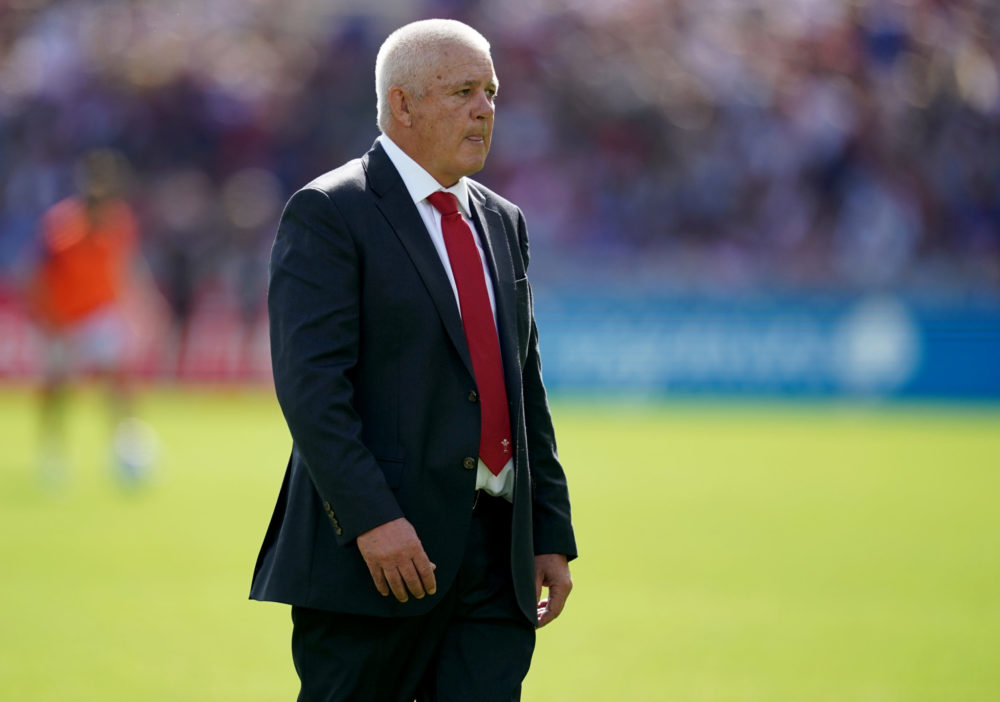A new look Wales in New South Wales, but the same old story

Simon Thomas
As far as the result goes, it was a repeat of what we have become used to from this fixture ever since 1969.
The 55-year wait for a Welsh win over the Wallabies on Australian soil continues as we head towards next Saturday’s second Test in Melbourne.
But it was also the same narrative in terms of what we have seen all too often from Warren Gatland’s Wales in recent times.
This was a significantly rejigged team, amid six changes – one of those positional – from the game against South Africa last month.
There were also a host of fresh faces, with eight of the match-day 23 having three or less caps and three of them making their first starts.
So a new cast list, but it was to be an all too familiar plot.
Once again, there was no lack of effort or spirit from the men in red.
But, as has become the norm, there was also no cutting edge in attack and no set-piece stability.
Reflecting first on the attacking game-plan, the brutal truth is there wasn’t one, certainly not an effective one.
The only time Wales really looked like scoring a try was off lineout drives.
That delivered their first half penalty try when Wallaby openside Fraser McReight was yellow carded for illegally collapsing the maul just as Dewi Lake was about to touch down.
And it looked to have brought them level when James Botham rounded off a lineout rumble just before the hour mark, only for the score to be ruled out for obstruction.
But, aside from that one area of play, Wales never really threatened the whitewash.
Chasing the game
Their inability to create anything meaningful with ball in hand was perhaps best illustrated during the final ten minutes when they were chasing the game.
Twice they went through multiple phases, moving the ball across the field and back again, without ever really penetrating the Aussie rearguard.
Their longest passage of attacking ultimately petered out as replacement fly-half Sam Costelow dinked a kick over the top, with debutant wing Josh Hathaway unable to hold on to the ball in the in-goal area.
Wales’ paucity in attack is all too apparent and it’s been the case for some time now.
They don’t have giant forwards who can crash you over the gain-line and they don’t have backs who can breach defences through guile and invention.
Gatland teams of yore used to wear opponents down by going from one edge to the other over multiple phases, waiting for a gap to eventually open up.
But against today’s supremely well-organised defences, you need a bit more subtlety to find a way through – either that or you need an array of enormous human beings.
Wales don’t have either.
Out of position
They are also asking people to play out of position, with Saturday’s 10 and 12 – Ben Thomas and Mason Grady – being handed different roles to the ones they undertake for Cardiff.
Employing Grady at inside centre is very much a throwback to Warrenball, but it’s questionable whether that is the way to go in the modern game.
You do wonder if his explosive pace and power would not be best utilised in a wider channel, with Thomas allowed to take on his regional role as a creative 12.
But Gatland has seldom gone down that second playmaker route and doesn’t seem about to start now.
It’s a shame because, with the current strategy, Wales are just not functioning offensively.
To compound the situation, they don’t have a reliable set-piece platform to launch attacks from.
You have to have a starting point in rugby, a base to work from. Wales don’t.
Scrum
The scrum was a major issue in the Twickenham defeat to the Springboks and it was same again in Sydney, particularly in the first half.
It was on 13 minutes that we saw the first scrum and it was to be unlucky 13 for the tourists.
They were simply destroyed, with the entire front row being shunted skywards, conceding a penalty in the process.
The second scrum of the game saw Wales offend again, guilty of angling in, and this was against a Wallaby scrum which had winger Filipo Daugunu on the flank with McReight in the sin-bin.
In fairness, youngsters Archie Griffin and Kemsley Mathias did manage to secure something of a foothold in the second half, but it’s also fair to point out this did coincide with the departure of starting Wallaby props Taniela Tupou and James Slipper.
As for the lineout, well there were recurring issues in that department with a succession of Welsh throws being picked off.
On a couple of occasions, it happened in promising attacking positions, which was all the more frustrating given the potency of their lineout maul.
The set-piece problems meant there simply wasn’t a consistently secure foundation stone to build off, amid a general lack of front foot ball.
Then there were the defensive issues.
Two of the three tries Wales conceded badly exposed their vulnerability in wide channels.
Firstly, Daugunu was able to blast through a huge gap between Grady and Rio Dyer as he came off his wing, sliding over the line in the tackle of Grady.
Then came the try that ultimately decided the contest. A loose kick infield from Hathaway allowed the Wallabies to launch a counter attack which saw full-back Tom Wright go outside replacement centre Nick Tompkins with indecent ease before stepping inside Grady to deliver a sharp finish.
The defensive alignment and organisation clearly needs addressing, with South Africa having sliced through with similar comfort a fortnight ago.
Indiscipline
Wales also suffered from indiscipline, concededing a sequence of first-half penalties culminating in prop Gareth Thomas being yellow carded for an offence in the passage of play where tighthead Tupou burrowed over for the game’s opening try.
So, all in all, numerous issues of concern following an eight straight defeat – a result which sees Wales drop down to eleventh in the world rankings, their lowest ever position.
These are tough times, there is no getting away from it.
So any positives? Well, yes. There was undoubted endeavour and effort, while a number of individuals shone through.
Aaron Wainwright marked his 50th cap with an outstanding display at No 8, constantly taking the fight to the opposition. He did remarkably well to somehow get the ball away from a retreating scrum and carried tirelessly, utilising his footwork and athleticism. He is playing the rugby of his life right now.
Elsewhere, Christ Tshiunza had his best game for Wales as he put in a mighty shift, showing up well in the contact area and in general play, suggesting second row might be where his international future lies.
Fellow Exeter lock Daf Jenkins put his body on the line in trademark fashion, as did Tommy Reffell on the openside flank, while Archie Griffin is worth persevering with at tighthead prop.
Admittedly, it was a chastening opening 40 minutes for Griffin on his first Test start, but he emerged from the initiation with some credit, finding his feet at the scrum and contributing well around the field.
He is still only 22 and is doing his growing up in public, so there is going to be some pain along the way, but Wales really need to find a future tighthead and he looks the best option.
Ben Thomas also had a decent first Test start at No 10, looking to vary his game, while his goal-kicking was spot on, but again you wonder whether he would be best employed in his club position of 12.
Overall, you get the impression there may be a Welsh team in there somewhere, but it’s probably going to take a couple of years to emerge.
One wonders just how much patience people will have with Gatland as that development process continues, particularly when there seems little sign of growth from an attacking perspective.
That’s now a 14th defeat in 20 games during the Kiwi’s second stint as head coach, with last September’s 40-6 World Cup victory over the Wallabies now seeming a distant memory.
The pressure is mounting heading into next Saturday’s Melbourne rematch.
Support our Nation today
For the price of a cup of coffee a month you can help us create an independent, not-for-profit, national news service for the people of Wales, by the people of Wales.







